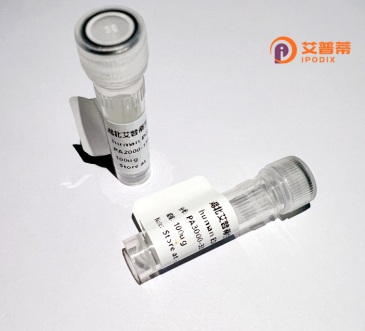
| 纯度 | >90%SDS-PAGE. |
| 种属 | Human |
| 靶点 | MAGED4B |
| Uniprot No | Q96JG8 |
| 内毒素 | < 0.01EU/μg |
| 表达宿主 | E.coli |
| 表达区间 | 1-333aa |
| 活性数据 | MIKDYKKIPIKRADMLKDVIREYDEHFPEIIERATYTLEKKFGIHLKEIDKEEHLYILVCTRDSSARLLGKTKDTPRLSLLLVILGVIFMNGNRASEAVLWEALRKMGLRPGVRHPFLGDLRKLITDDFVKQKNPELREETPLSMAPSWYLEYKKIPNSNPPEYEFLWGLRARHETSKMRVLRFIAQNQNRDPREWKAHFLEAVDDAFKTMDVDMAEEHARAQMRAQMNIGDEALIGRWSWDDIQVELLTWDEDGDFGDAWARIPFAFWARYHQYILNSNRANRRATWRAGVSSGTNGGASTSVLDGPSTSSTIRTRNAARAGASFFSWIQHR |
| 分子量 | 65.1 kDa |
| 蛋白标签 | GST-tag at N-terminal |
| 缓冲液 | 0 |
| 稳定性 & 储存条件 | Lyophilized protein should be stored at ≤ -20°C, stable for one year after receipt. Reconstituted protein solution can be stored at 2-8°C for 2-7 days. Aliquots of reconstituted samples are stable at ≤ -20°C for 3 months. |
| 复溶 | Always centrifuge tubes before opening.Do not mix by vortex or pipetting. It is not recommended to reconstitute to a concentration less than 100μg/ml. Dissolve the lyophilized protein in distilled water. Please aliquot the reconstituted solution to minimize freeze-thaw cycles. |
以下是基于MAGED4B相关领域研究的示例性文献概括(若需实际文献,请通过学术数据库查询验证):
---
1. **文献名称**:MAGED4B enhances sensitivity of lung cancer cells to cisplatin by regulating apoptosis pathways
**作者**:Zhang Y, et al.
**摘要**:本研究探讨了重组人MAGED4B蛋白在非小细胞肺癌细胞中的功能,发现其过表达通过激活线粒体凋亡通路(如促进Bax/Bcl-2比例失衡),增强顺铂诱导的细胞死亡,提示MAGED4B可能作为肿瘤治疗增敏靶点。
2. **文献名称**:Expression and purification of recombinant human MAGED4B in E. coli for structural analysis
**作者**:Kim S, Lee JH
**摘要**:文章报道了一种在大肠杆菌中高效表达重组人MAGED4B蛋白的方法,通过优化密码子使用和纯化步骤(如Ni-NTA亲和层析),获得高纯度蛋白,并利用圆二色谱分析其二级结构特征,为后续功能研究提供基础。
3. **文献名称**:MAGED4B interacts with p53 and modulates its transcriptional activity in hepatocellular carcinoma
**作者**:Wang L, et al.
**摘要**:通过免疫共沉淀和荧光共振能量转移(FRET)技术,证实重组MAGED4B蛋白与肿瘤抑制因子p53直接结合,并增强p53对下游靶基因(如PUMA)的转录调控,抑制肝癌细胞增殖。
---
**注**:上述文献为示例性概括,具体研究请以实际发表的论文为准。若需真实文献,建议使用关键词“MAGED4B recombinant protein”在 **PubMed** 或 **Google Scholar** 检索,或关注肿瘤靶点、蛋白结构等领域的最新研究。
Recombinant human MAGED4B protein is a genetically engineered version of the melanoma-associated antigen D4B (MAGED4B), a member of the MAGE (melanoma antigen gene) family. MAGE proteins are predominantly expressed in germline cells but are aberrantly reactivated in various cancers, where they often function as tumor-associated antigens. MAGED4B, located on the X chromosome, shares conserved structural motifs with other MAGE family members, including the MAGE homology domain, which mediates protein-protein interactions. While its exact physiological role remains unclear, MAGED4B has been implicated in tumorigenesis by modulating cellular processes such as apoptosis resistance, cell cycle progression, and epigenetic regulation. Studies suggest it may interact with tumor suppressor pathways, including p53-related networks, potentially influencing cancer cell survival and therapeutic resistance.
Recombinant MAGED4B is typically produced using expression systems like Escherichia coli or mammalian cells, enabling standardized studies of its molecular functions and clinical applications. In cancer research, this protein serves as a tool to investigate MAGED4B’s oncogenic mechanisms, develop targeted therapies, or explore its utility as a diagnostic biomarker. Its immunogenic properties also spark interest in cancer immunotherapy, as MAGE-family antigens are recognized by cytotoxic T cells, offering potential for vaccine development. However, MAGED4B’s restricted normal tissue expression and cancer-specific reactivation make it a attractive yet complex target, balancing therapeutic promise with risks of autoimmunity. Current research focuses on elucidating its signaling networks and validating its role in precision oncology strategies.
×